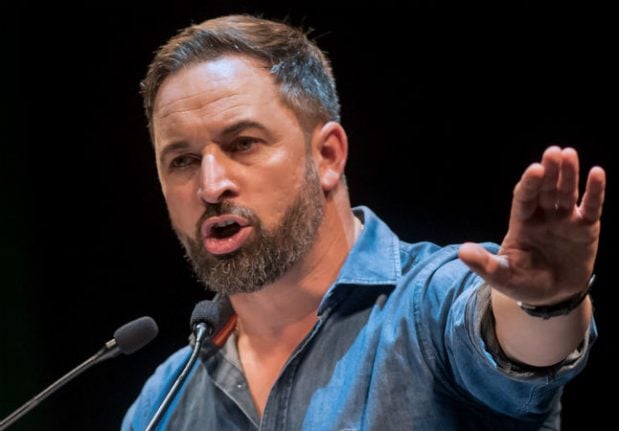ELECTION
PROFILE: Vox leader Santiago Abascal
With his rallying cry of "Spaniards first" and untempered rage against those betraying the unity of Spain, Santiago Abascal has managed to turn the Catalan crisis into political capital that has fuelled the rise of his far-right Vox.
Published: 10 November 2019 08:40 CET

Santiago Abascal has skilfully used the Catalan crisis to boost his party's position. Photo: Ander Gillenea/AFP
Sporting an impeccably-trimmed beard and with a piercing stare, Abascal has become the poster boy for the resurgent far right which in the past year has made significant political inroads following decades on the margins after the death of dictator Francisco Franco.
Launched in 2014 by Abascal and a handful of others from the hardline fringe of the rightwing Popular Party, Vox struggled to gain traction at first, attracting only a smattering of voters with its ultra-conservative stance on immigration, gender violence and traditional family values.
A media-savvy operator who comes across as courteous and affable while deftly parrying difficult questions, it is Abascal's tough line on the Catalan separatist crisis and his impassioned defence of Spain's unity that has drawn growing support.
In April, the party made its parliamentary debut after a general election in which it won 24 of the assembly's 350 seats. Polls show it could double it that number in Sunday's repeat general election, becoming the third largest party in parliament.
“I'm not a xenophobe,” said Abascal, smiling and joking as he appeared on a popular Spanish talk show that was watched by 4.7 million viewers in which he called for the expulsion of unaccompanied immigrant minors. “I'm an open and tolerant person.”
'Not a charismatic leader'
Banning separatist parties, taking direct control of the semi-autonomous region of Catalonia to stop secession, repealing a law that fights gender violence, Abascal's ultra-conservative proposals have sparked outrage both online and off.
Whether railing against immigrants, Islam or the bias against men in Spain's gender violence laws, the tough-talking career politician has continued to pull in the crowds with often exaggerated or even false populist claims.
But it has been his uncompromising attack on the “criminal separatism” in Catalonia that led to a failed independence bid two years ago that has been the cornerstone of Abascal's success.
“If you look at polls, he's very popular amongst his voters… but it's not his charisma that is driving voters,” said Ignacio Jurado, a politics expert at Madrid's Carlos III University. “What has made the party successful is the crisis with Catalonia and the fact that the mainstream parties were unable to address it.”
ETA and the Smith & Wesson
Born on April 14, 1976 in the northern port city of Bilbao, Abascal was raised in Amurrio, a village where his grandfather served as mayor during the Franco years.
Growing up in a region where politicians from both the left and the right were regularly targeted by the ETA separatist movement, Abascal said his father, a local PP councillor, was also in the firing line and escaped three attempts on his life.
But it didn't put off the young Abascal, who joined the party as soon as he turned 18 although he was forced to go everywhere with two bodyguards at his side.
“His political experience in the Basque Country, years of threats, must have influenced his ideas,” says Beatriz Acha, a political scientist at the Public University of Navarra.
Today, he openly acknowledges owning a Smith & Wesson firearm, which is rare in a country where the law severely restricts gun ownership — a law he plans to relax.
Married to a stylish Instagram influencer called Lidia Bedman, who in recent months has been much more in the public eye, Abascal has four children, two from a previous marriage.
Party rallies often feature footage of him scaling mountains or striding manfully through forests and fields.
Last year, another controversial video emerged of him riding a horse, cowboy-style, through Spain's arid south, entitled
“The Reconquista begins in Andalusia” — a reference to a series of centuries-long wars to recapture territory from the Muslims who occupied most of the Iberian Peninsula in the early 8th century.
Url copied to clipboard!



 Please whitelist us to continue reading.
Please whitelist us to continue reading.
Member comments